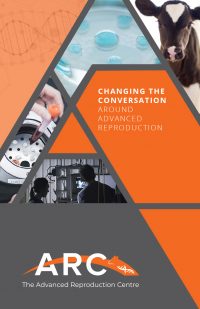Services
The ARC is a comprehensive reproductive solutions provider pursuing the best genetic opportunities for your herd
Our reproduction experts include genetic advisors and an IVF lab in-house utilized by veterinarians with extensive ET and IVF experience
The worlds most Advanced Reproduction Technologies
Donor Care
At The Arc, we pride ourselves on having all the animals in our care maintained at an exceptionally high health status. We routinely test the blood and health of both our donors and recipients. We also test every load of forage that enters the barn so we can provide the animals with optimum nutrition.
Embryo Transfer
Embryo transfer refers to a series of procedures that involve stimulating the donor’s ovaries to produce multiple ovulations, inseminating the donor, and seven days later collecting or “flushing” the embryos out of the uterus. The embryos are assessed under a microscope and either transferred into recipient females or frozen for later use. Thus a single donor can have multiple offspring on the ground at once.
IVF
In vitro fertilization (IVF) means fertilizing an oocyte (immature egg cell) outside the organism, such as in a test tube or culture dish. IVF offers more opportunities to collect elite donors, as young as seven months of age, during the first trimester of pregnancy and as frequently as every two weeks.
Recipient Program
The program is not exclusive for our IVF customers. It can be tailored to meet the needs of any client needing access to extra recipients. Only having to purchase recipients at 60 days pregnant, it presents a great opportunity. The recipient herd has proven very successful for producers who have limitations in running a recipient program.
Beef Reproductive Solutions
Choose the genetic solution(s) based on the options that fit your needs. Beef cows often make the best IVF donors and are known for producing many oocytes per collection. The number of beef herds benefiting from the Advanced Reproduction Centre’s services has been steadily growing as this information becomes more widely known.
Choose the genetic solution(s) based on the options that fit your needs:
| Genetic Goals | Use ARC Recipients | Purchase Genetics | Conventional Flushing | In-Vitro Fertilization |
|---|---|---|---|---|
| I want to improve the genetics of my herd | ♦ | ♦ | ♦ | ♦ |
| I want to get the most out of a high-value animal that I own | ♦ | ♦ | ♦ | |
| I have mostly low-value animals to work with | ♦ | |||
| I want to create my own embryos | ♦ | ♦ | ||
| I’m looking for the fastest way to improve my herd | ♦ | ♦ | ♦ | |
| I have or want to maximize the embryos in my inventory | ♦ | |||
| I want to create females from sires not available as sexed | ♦ | |||
| I want to export and sell the genetics of my herd | ♦ | ♦ | ||
| I’m looking to lower my cost through strategies such as pooling | ♦ |
Purchase Genetics
Higher Cost / Lower Risk
Identify your herd’s genetic weaknesses
Source embryos or live animals with appropriate traits
Utilize ARC’s Recipient herd or contact us to coordinate a recipient strategy in your area or Send new donors to ARC for Conventional Flushing or IVF
Send resulting calves to ARC as donors for Flushing or IVF for maximum herd improvement!
Conventional Flushing
Lower cost / Mid Risk
Identify your highest value animals to use as donors
Select semen that meets your needs: Conventional or Sexed
Implant fresh embryos immediately into your recipient or at ARC’s recipient herd
Keep frozen embryos for later use or to sell / export
Flush each animal as often as once a month
In-Vitro Fertilization
Mid Cost / Mid Risk
Identify your highest value animals to use as donors
Select semen that meets your needs: Conventional, Sexed or Reverse Sorted
Collect your donors every 2 weeks (Pooling can be utilized as a cost-reduction method)
Implant fresh embryos immediately into your recipient or into ARC’s recipient herd
Keep frozen embryos for later use or to sell / export
Repeat IVF as often as every 2 weeks per animal



